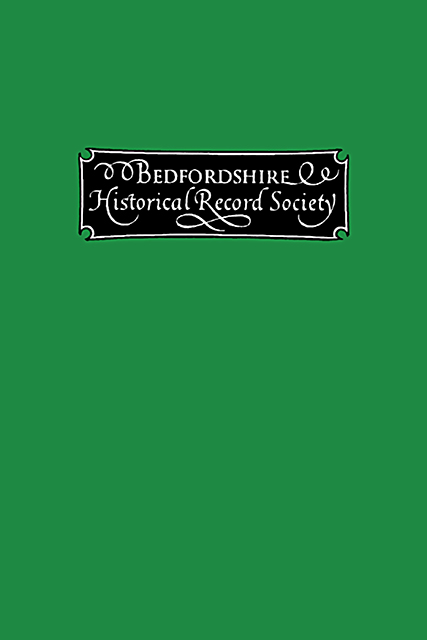Book contents
- Frontmatter
- Symbols and Abbreviations
- Contents
- General Note
- John Harvey of Ickwell, 1688-9
- Edmond and Christian Williamson of Husborne Crawley, 1709-20
- Henry Taylor of Pulloxhill, 1750-72
- John Salusbury of Leighton Buzzard, 1757-9
- John Pedley of Great Barford, 1773-95
- Elizabeth Brown of Ampthill, 1778-91
- Edward Arpin of Felmersham, 1763-1831
- Catherine Young (later, Maclear) of Bedford, 1832-5 and 1846
- Sir John Burgoyne of Sutton, 1854
- Major J. H. Brooks and the Indian Mutiny, 1857
- The Rev. G. D. Newbolt of Souldrop, 1856-95
- Some Letters from Bedfordshire Pioneers in Australia, 1842-86
- Index Nominorum et Locorum
- Index Rerum
- Miscellaneous Endmatter
Elizabeth Brown of Ampthill, 1778-91
Published online by Cambridge University Press: 14 July 2023
- Frontmatter
- Symbols and Abbreviations
- Contents
- General Note
- John Harvey of Ickwell, 1688-9
- Edmond and Christian Williamson of Husborne Crawley, 1709-20
- Henry Taylor of Pulloxhill, 1750-72
- John Salusbury of Leighton Buzzard, 1757-9
- John Pedley of Great Barford, 1773-95
- Elizabeth Brown of Ampthill, 1778-91
- Edward Arpin of Felmersham, 1763-1831
- Catherine Young (later, Maclear) of Bedford, 1832-5 and 1846
- Sir John Burgoyne of Sutton, 1854
- Major J. H. Brooks and the Indian Mutiny, 1857
- The Rev. G. D. Newbolt of Souldrop, 1856-95
- Some Letters from Bedfordshire Pioneers in Australia, 1842-86
- Index Nominorum et Locorum
- Index Rerum
- Miscellaneous Endmatter
Summary
Introduction
This diary is the mirror of a personality and of a small community : of Elizabeth Brown in her girlhood at Ampthill, afterwards Elizabeth Wheeler; and of the Ampthill Meeting of the Society of Friends. The original MS. has apparently not survived, but the diary was fair-copied after her death by her husband (whose interpolations are given in round brackets).
Elizabeth, born 1754, was the daughter of William Brown, an Ampthill draper with property in the neighbourhood, and Ruth, widow of Peter Exton. In 1781 she married Joshua Wheeler of Hitchin, then a mealman, afterwards a woolstapler. Browns (originally of Podington) and Wheelers (originally of Cranfield) were among the earliest Quaker families in Bedfordshire, and it was at Beckerings Park, near Ampthill, that a “general Yearly Meeting for the whole nation” was held in 1658. In Bedford and in the north of the county the early Meetings faded out; but south of Bedford there were several in the 18th century. Of these, she mentions Luton, Pulloxhill and Sewell; also Hogsty End on the Bucks, border. The Monthly (or area) Meeting she mentions once, in May, 1779; Bedfordshire Quarterly Meeting three times (twice at Luton and once at Ampthill). When away from home she attended other Meetings : Buckinghamshire Quarterly Meeting at Sherrington, and Northamptonshire Quarterly Meeting at Northampton. She also describes one wedding and two funerals (non-Friends were present at both the latter). The Queries she refers to had originally been sent out by London Yearly Meeting to elicit facts (for instance, “How many public Friends died?”), but by the late 18th century they had been elaborated, and were a means by which deviations from the “testimonies” and “peculiarities” (for instance, “plainness of speech, behaviour and apparel”) were speedily discovered and the remiss brought under discipline. The “public Friends”, such as Isaac Sharples of Hitchin, travelled round to different Meetings. In spite of the American War of Independence there were close relations between English and American Friends; Nicholas Waln she met at Dover; and William Matthews and three women (Rebecca Wright of New Jersey and Mehetabel Jenkins and Patience Brayton of Massachusetts) came to her home.
- Type
- Chapter
- Information
- Some Bedfordshire Diaries , pp. 110 - 129Publisher: Boydell & BrewerFirst published in: 2023



